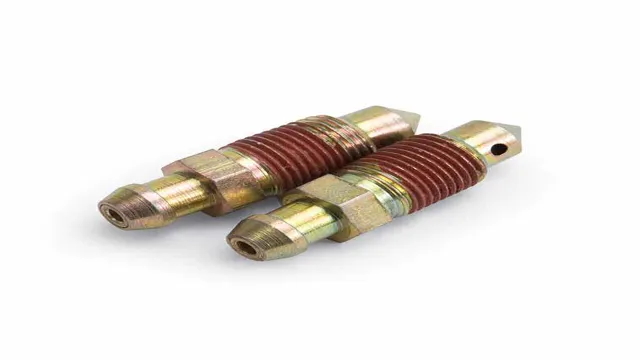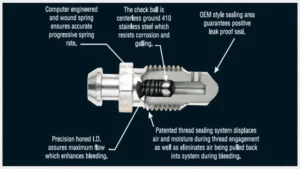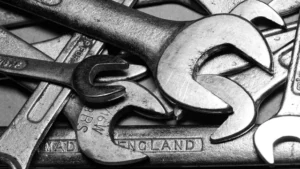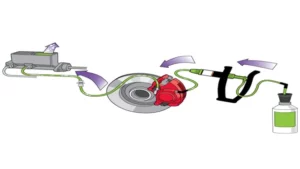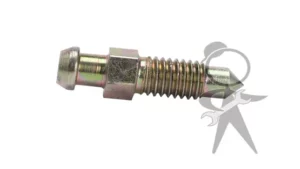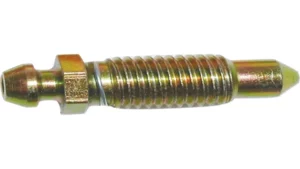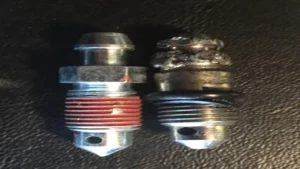Have you ever wondered if the brake bleeder screws on your car are universal? It’s a common question among car owners who are looking to replace or upgrade their brake system. The short answer is no, brake bleeder screws are not universal. There are various types of brake bleeder screws available, and they aren’t interchangeable between different makes and models of cars.
In this blog post, we’ll dive a bit deeper into what brake bleeder screws are, why they are important, and why you need to know which type you need for your vehicle. So, buckle up and get ready to learn about the world of brake bleeder screws!
Understanding Brake Bleeder Screws
Are brake bleeder screws universal? The answer is no. While some aspects of brake systems are universal, such as the fact that all brakes work by applying pressure to slow or stop a vehicle, the brake bleeder screw is not one of them. Brake bleeder screws vary in size, shape, and thread pitch, which means that not all screws will fit all vehicles.
It is important to choose the correct brake bleeder screw for your specific make and model of vehicle to ensure proper function and safety. Furthermore, some brake systems may have multiple bleeder screws, each with different specifications, so it is important to research and consult with professionals when attempting to replace or repair brake bleeder screws. Overall, while brake bleeder screws may seem like a small component of a brake system, they play a crucial role in maintaining the safety and functionality of your vehicle’s brakes.
Function of Brake Bleeder Screws
Brake bleeder screws are an essential component of the braking system that is often overlooked. These small, threaded screws are located at each brake caliper and wheel cylinder and play a crucial role in maintaining the proper function of the brakes. Their purpose is to remove any air bubbles or excess fluid that may accumulate in the brake lines, preventing the brake pedal from feeling spongy or soft.
When the brake pedal is pressed, a plunger compresses the brake fluid, causing the brake pads to make contact with the rotors, slowing or stopping the vehicle. However, if air bubbles get trapped in the brake lines, they can cause a decrease in braking performance, resulting in longer stopping distances. Brake bleeder screws allow air and fluid to be purged from the system, making sure that the brakes perform at their peak.
So, ensure that the brake bleeder screws are functioning correctly to keep your vehicle safe on the road.
Types of Brake Bleeder Screws
Brake Bleeder Screws Brake bleeder screws are crucial components in the brake system that help to expel air and ensure optimal brake pressure. Understanding the different types of brake bleeder screws is essential in determining the right one for your vehicle. The most common types of bleeder screws include standard, speed bleeders, and rusted bleeders.
Standard bleeder screws are the most common type, and they come in various sizes and lengths to fit different brake systems. Speed bleeders, on the other hand, have a unique design that eliminates the need for a second person when bleeding your brakes. These screws have a one-way valve that allows the air to escape while preventing air from re-entering the system.
Rusted bleeders are screws that have accumulated rust and debris, causing them to become difficult to remove. It’s essential to identify these screws early on to avoid causing permanent damage or require extensive repair. Remember, the right type of brake bleeder screw plays a crucial role in ensuring your brake system works appropriately and safely.
Compatibility of Brake Bleeder Screws
Are brake bleeder screws universal? The answer is no, brake bleeder screws are not universal. They vary in size and thread pitch depending on the make and model of the vehicle. Therefore, it is essential to get the correct size and thread pitch for your specific vehicle when replacing the brake bleeder screw.
Using an incorrect size or thread pitch can lead to brake fluid leaks and safety issues. Additionally, it is important to use high-quality brake bleeder screws made from durable materials to ensure long-lasting performance and reliability. When it comes to brake system maintenance, always use the right parts and follow the manufacturer’s recommendations to ensure safe and efficient braking.
Vehicle-Specific Brake Bleeder Screws
If you’re in the market for new brake bleeder screws, it’s important to consider compatibility with your vehicle. Not all brake bleeder screws are created equal, and many are made specifically for certain makes and models of cars. Using the wrong screw can result in leaks, ineffective brakes, and even safety hazards.
To ensure that you get the right brake bleeder screw for your vehicle, consult your owner’s manual or do some research online. Many auto parts websites offer compatibility checkers where you can enter your car’s make, model, and year to find the right part. Don’t take any chances when it comes to your brakes – make sure you have the right parts for your specific vehicle.
Universal Brake Bleeder Screws
Brake Bleeder Screws When it comes to brake bleeding, using the right equipment is crucial. One component that shouldn’t be overlooked is the brake bleeder screw. Fortunately, there are universal brake bleeder screws available that are compatible with a range of vehicles.
These screws are a great choice for mechanics working on various makes and models, or for car owners who need to bleed their brakes at home. However, it’s important to check compatibility before purchasing universal brake bleeder screws, as not all models may be suitable for every vehicle. It’s also worth noting that different brake systems may require different types of bleeder screws, so it’s important to do your research to ensure you’re using the right one.
With the right brake bleeder screw, brake bleeding becomes a much easier task that can help keep your vehicle’s braking system in top condition.
Cross-Compatibility of Universal Screws
When it comes to brake bleeder screws, cross-compatibility is an essential factor to consider. These screws are used to expel air from brake lines, and using the wrong size or type can lead to brake failure, putting drivers and passengers at risk. Thankfully, most universal screws are designed to fit various makes and models of vehicles, but it’s important to check the vehicle’s specifications before purchasing.
Some screws may require a specific thread size and pitch, and using the wrong one can cause damage to the braking system. It’s always better to be safe than sorry and take the time to ensure compatibility before attempting to replace brake bleeder screws. So, before you hit the road, make sure your brake system is properly maintained and compatible with the correct brake bleeder screws to ensure the safety of everyone inside the vehicle.
Choosing the Right Brake Bleeder Screws
Many people wonder if brake bleeder screws are universal, and the answer is no. It’s important to choose the right brake bleeder screws for your specific make and model of vehicle to ensure proper function and safety. There are a variety of types and sizes of brake bleeder screws, and it’s crucial to select the correct ones that match the thread size and pitch of your vehicle.
Additionally, some manufacturers use different materials or coatings for their brake bleeder screws, such as stainless steel or zinc plating, which can impact their performance and longevity. It’s best to consult with a professional mechanic or refer to your vehicle’s manual to determine the correct brake bleeder screws for your specific needs. Always prioritize safety when working on your car’s braking system, as it is essential for both you and your passengers.
Factors to Consider
Choosing the right brake bleeder screws is crucial for the safety and performance of your vehicle. There are several factors to consider when selecting the right brake bleeder screws for your car. Firstly, it’s vital to ensure that the screws are compatible with your car’s make and model.
Additionally, the type of brake system also determines the type of brake bleeder screws needed. Different brake systems require different types of screws, so it’s essential to get the right one. Another crucial factor to consider is the size and construction of the screw.
The size of the screw should match the diameter of the brake line, and it should be made of high-quality materials that can withstand the pressures and forces associated with braking. Lastly, it’s vital to consider the price and durability of the brake bleeder screws. Opt for a product that offers high durability and quality at an affordable price.
By considering these factors, you can choose the right brake bleeder screws that will improve your vehicle’s performance while ensuring your safety on the road.
Consulting with a Professional Mechanic
When it comes to choosing the right brake bleeder screws for your vehicle, it’s important to consult with a professional mechanic. There are various types of bleeder screws, including those with different thread sizes and lengths, and using the wrong ones can lead to brake system failure. A mechanic can help you determine the correct size and length of the screw for your specific vehicle so you can feel confident in the safety and performance of your brakes.
Remember, the brakes on your car are an essential component for your safety and the safety of others on the road, so don’t take any chances when it comes to replacing parts. Seek the guidance of a mechanic to ensure the job is done right.
Conclusion
In conclusion, while brake bleeder screws may share similarities in their design and function, they are not necessarily universal. Factors such as thread size, length, and shape can vary between different vehicles and brake systems. It’s important to always consult the manufacturer’s specifications or an experienced mechanic before attempting to replace or adjust brake bleeder screws.
Remember, a little research and caution now can save you some serious braking headaches down the road!”
FAQs
1. What are brake bleeder screws and what do they do?
Brake bleeder screws are used to remove air from the brake lines and can be found on brake calipers or cylinders.
2. Are all brake bleeder screws universal?
No, brake bleeder screws can vary in thread size and pitch, so it’s important to double-check the specific type needed for your vehicle.
3. How often should brake bleeder screws be replaced?
Brake bleeder screws don’t typically need to be replaced unless they become damaged or stripped. Regular maintenance can help prevent this issue.
4. Can I use a substitute for a brake bleeder screw, such as a bolt or nail?
No, using a substitute for a brake bleeder screw can result in a dangerous brake failure. Always use the appropriate part for the job.
5. What is the proper way to bleed brakes using a bleeder screw?
Start by filling the brake fluid reservoir and loosening the bleeder screw. Have someone press the brake pedal while you tighten the screw, then repeat until all air is removed.
6. Can I reuse an old brake bleeder screw?
It’s generally recommended to use a new brake bleeder screw for each brake job to ensure proper function and prevent leaks.
7. How do I know if my brake bleeder screw is leaking?
Leaking brake fluid or a spongy brake pedal are signs that your brake bleeder screw may be leaking and should be inspected and possibly replaced.
